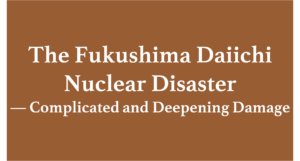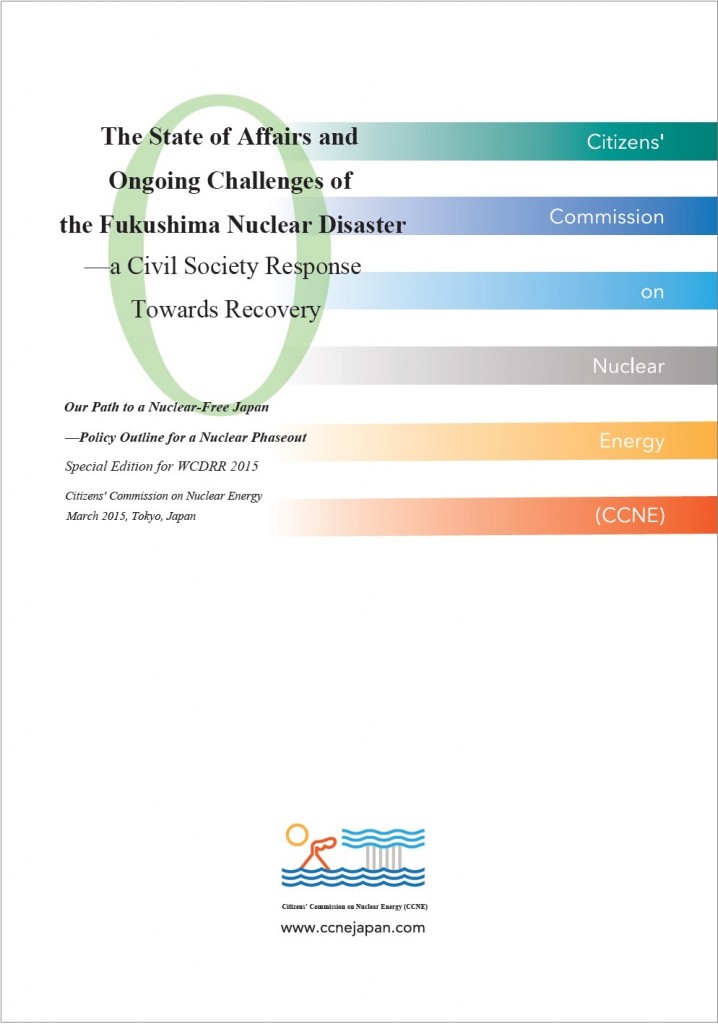“Radiological Protection of People and the Environment
in the Event of a Large Nuclear Accident”
|
Second letter to ICRP from CCNE
September 9, 2019
|
![]() Reference documents
Reference documents
Reply to CCNE from ICRP![]() August 20, 2019 (only Japanese)
August 20, 2019 (only Japanese)
CCNE’s Open Letter to ICRP![]() August 9, 2019
August 9, 2019
September 9, 2019
Claire Cousins, Chair, ICRP
Jacques Lochard, Vice-Chair, ICRP
Christopher H. Clement, Scientific Secretary, ICRP
Michiaki Kai, Chair of the Task Group 93
cc: Members of the Main Commission and the Scientific Secretary
Members of the Task Group 93
Members of the Committee 4
Chairs of the Committee 1-3
in the Event of a Large Nuclear Accident”
Dear Sirs,
Thank you very much for the reply letter from Mr. Clement and Dr. Kai of August 20th to our letter of August 9th. Subsequently, a public meeting was held by citizen groups on September 2nd in Tokyo, inviting Dr. Kai to explain the contents of the draft report. It was a worthwhile meeting. Quite a number of questions were raised by the participants, and Dr. Kai’s answers clarified some of the issues. We are very grateful to Dr. Kai for his valuable contribution. However, it also became clear during the meeting that there were considerable discrepancies between the Japanese public recognition and the ICRP’s view in the draft report (particularly Annex B) regarding the realities of the adverse effects of the Fukushima nuclear power plant accident. We have also found that there are a number of terminology issues. So far, only a summary translation has been provided from ICRP. Civil society groups are jointly preparing a volunteer translation of the full draft, but it would need inspection and review by TG93 members for precision. We firmly believe that an official Japanese edition of the draft ICRP report is essential so that the Japanese public, who are experiencing the Fukushima disaster at first hand, should understand the ICRP proposals properly and could offer constructive comments for the current consultation process.
Although we welcome your recent decision to accept comments in Japanese on your website, we are concerned about how those comments submitted in Japanese will be treated at ICRP. Dr. Kai explained, at the September 2nd meeting in Tokyo, that the Japanese members of the ICRP/TG93 would “summarize” the Japanese comments and translate the summary into English for ICRP’s internal meetings. We cannot regard this treatment fair enough. It is indispensable for ICRP to translate all of the Japanese submissions into English so that the comments are fully shared and reviewed by the international members of ICRP. Dr. Kai also said that ICRP normally would not prepare replies to the public comments. We strongly expect ICRP to provide feedback in order to reduce discrepancies and disagreements that exist among the stakeholders concerning better ways of the radiological protections after the severe nuclear accident.
Also, ICRP announced to accept comments on the draft recommendation in Japanese by October 25th. It still appears, however, that the formal consultation period ends on September 20th as publicized on the website. This has caused confusion among civil society members here in Japan whether or not the comments submitted in Japanese are officially accepted. In our previous letter, we proposed that the comment period be substantially extended, at least until the end of the year. We request again that ICRP should extend consultation period formally in order to avoid any confusion about the fair treatment of the public comments and to reflect the outcomes of additional public meetings we have requested.
We take note that a symposium will be held in Tokyo on October 25th and its program has been publicized. We are disappointed to find that the program include only a limited time for questions and discussions with the general public; we also find it rather impracticable that the entire afternoon session is without Japanese interpretation despite all of the lecturers are Japanese. We reiterate the necessity of a wider inclusion of those affected by the Fukushima accident. You mentioned that ICRP had already explained and discussed the matter in the opportunities such as “Fukushima dialogue.” We understand that the Fukushima Dialogue has limited focus and participants and has not cover the full range of the damage caused by the Fukushima accident. There are a large number of other people directly and variedly affected by the accident, including those who continue to evacuate or who are seeking the right to evacuate. If ICRP is truly willing to carry out an open and fair consultation process, it is essential that you should listen to the voices of the people who are under the ongoing adverse effects of the large nuclear accident. Such voices would compose most valuable inputs for the improvement of the ICRP recommendations.
To recap, we request ICRP to take further positive steps in the following:
(1) Formal Japanese edition of the draft
(2) Fair treatment for the comments submitted in Japanese
(3) Feedback on the comments submitted
(4) Formal extension of the consultation period
(5) Additional public consultation meetings
We would appreciate your response possibly before September 18th, 2019.
Thanking you in advance for your consideration,
Yours sincerely,
Kenichi Oshima, Chair, CCNE (Professor, Ryukoku University, Kyoto, Japan)
Kanna Mitsuta, Deputy Chair, CCNE (Executive Director, Friends of the Earth Japan)
Komei Hosokawa, Chief Secretary, CCNE (Professor, Kyoto Seika University, Kyoto, Japan)


